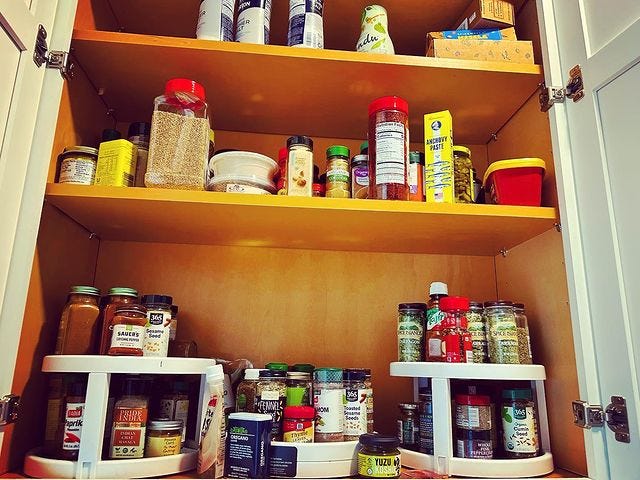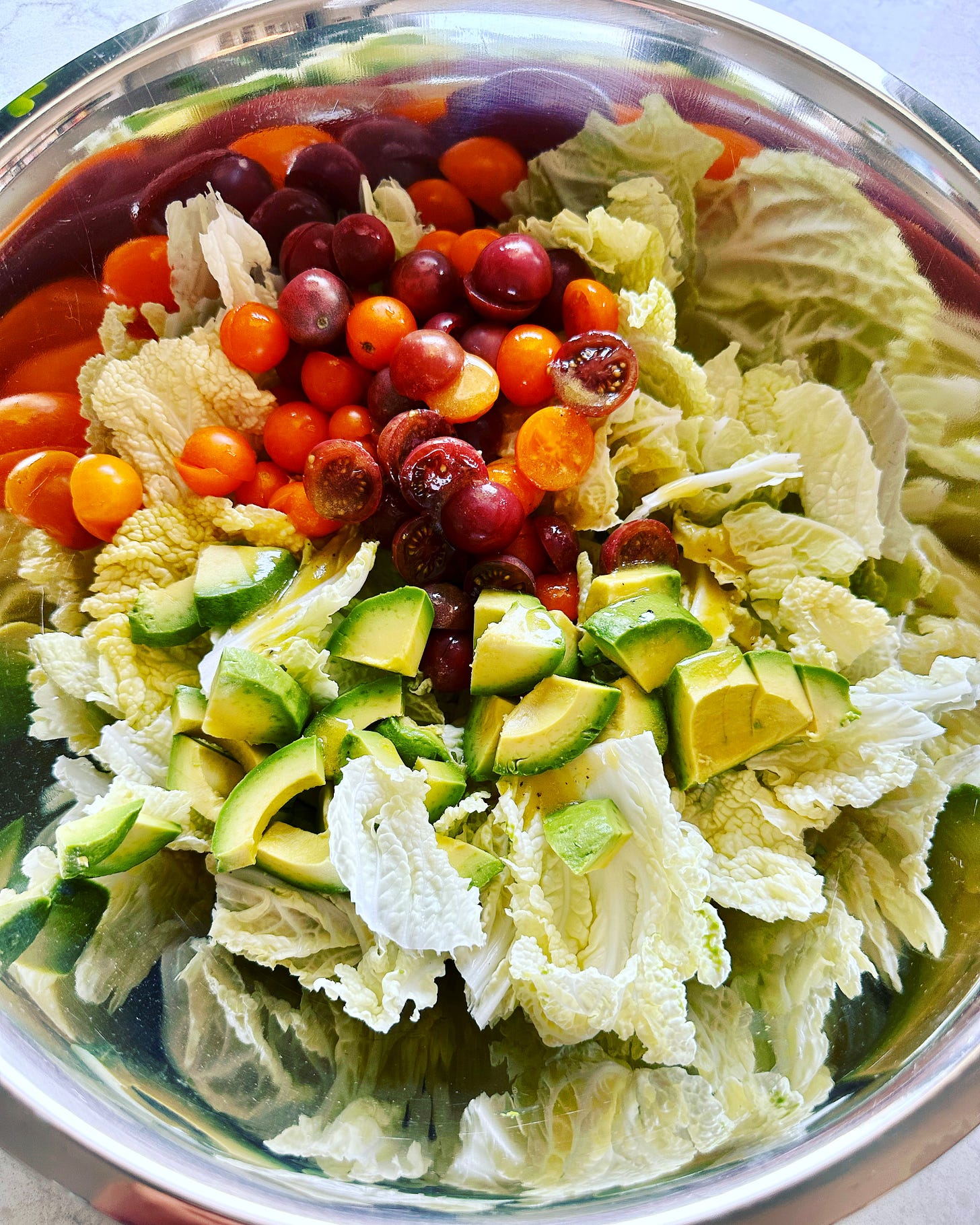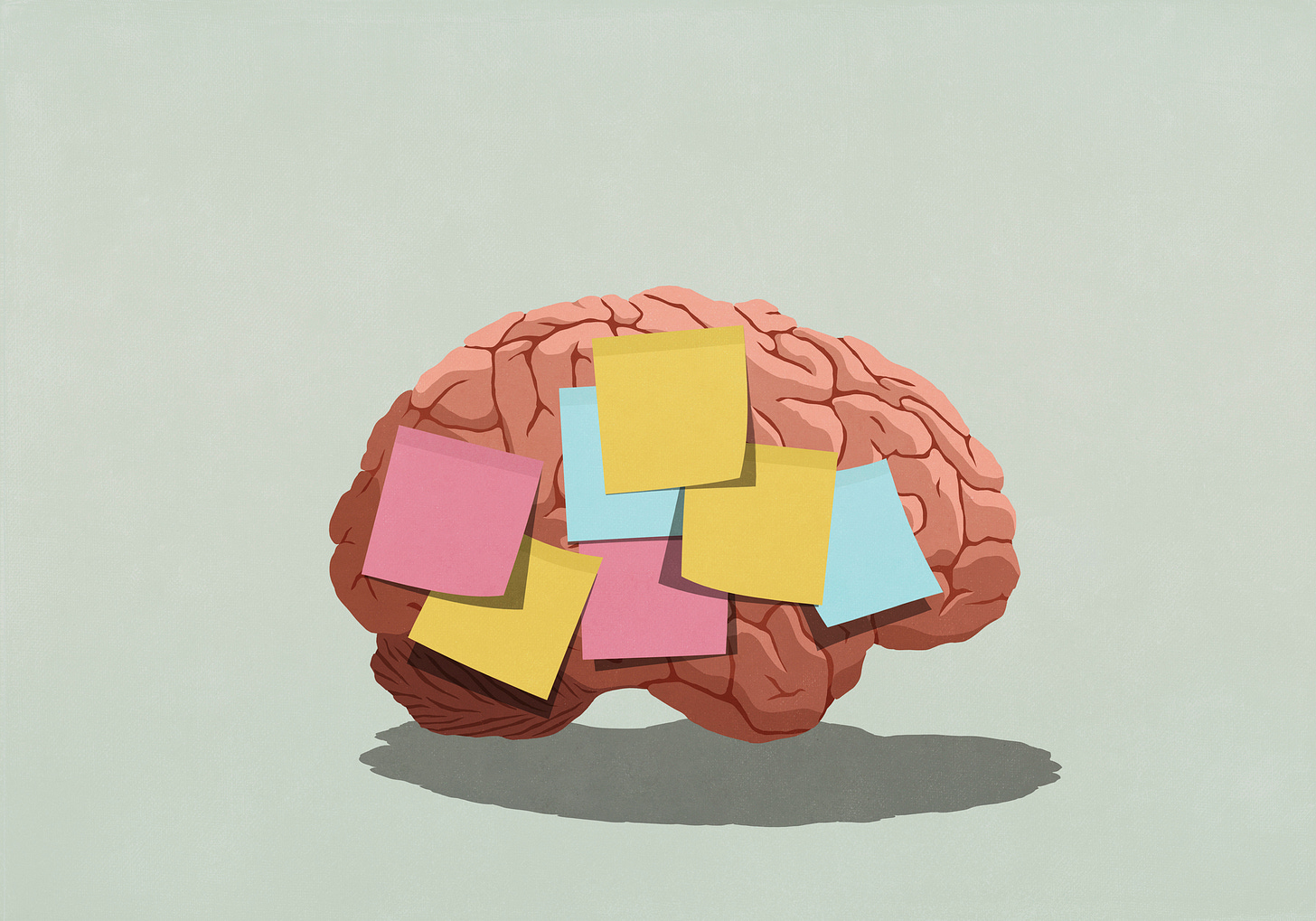Three Luscious, Easy, Somewhat Vintage Salads
I say "somewhat" because I'm old enough to consider them fairly new

I HAVE NEVER KEPT a genuine writer’s notebook—even back when my original intention (like every single journalist’s on the planet) was to publish novels or short stories. Meaning no single special book reserved for marvelous ideas and random piercing thoughts and piquant memories. I’m not even sure if I have piercing thoughts.
But I have always kept a hell of a lot of lists and piles of torn paper with jotted notes to myself meant to jog my aspirational enthusiasm for really getting things done. Even if it’s just something like reminding myself to clean off my desk (which has never happened).
One recent note reads Dried Tarragon Check pantry first! But I forgot to check the pantry and bought more tarragon, as the Instagram post below shows, because my organizational methodology is what management scientists and operational researchers refer to as hahahahaha.
I got quite upset last week when I couldn’t find one of these jumbles of notes/lists that I had carefully placed in a folder full of alluring vintage salads and installed in a spot that I knew I would never forget. Where is it? How should I know? I assume a recipe burglar broke into my apartment, found this folder, and sneaked out quietly.
I realize even Marie Kondo has probably done this sort of thing. But since this folder had three recipes I wanted to share here today, losing it sent me spinning off into a melodramatic reverie about the nature of memory and the physics and biology of how our perception of time changes over our lifetimes. Which is to say: I blamed losing the folder on the fact that I’m no longer young per se.
It goes against my nature, but I was clearly scapegoating my age. (Does anyone ever give being no longer young credit for doing anything good?)
Before I hit 60 (a couple of years ago), incidents like this just didn’t faze me. And in general, I lived a pretty long time before I ever thought about my own age as a liability, much less whether it could make my life more difficult or alter my “standing” in this world.
In fact, I remember being surprised the first time I saw someone not much older than I freak out about his seniority. I was in my early 40s, living in Chicago and working as a reporter at the Tribune. I’d gone to a 50th birthday party that a friend was throwing for an acquaintance and made the grave mistake of jokingly welcoming him to middle age even though we were both already there. Obviously.

He recoiled as if slapped. “I’m not middle-aged,” he said, then looked around the room in a bit of a panic—searching for people to corroborate his claim or to make sure no one heard? I wasn’t sure.
It seemed unwise to engage him further, so I nodded in acknowledgment and headed toward the safety of canapés. Although I’ve never forgotten this exchange—because how much denial do you have to be in to forget how to add? And who in the world wants to live to 120 or 140 when it already feels like the seasons last just 5 minutes?—I can’t remember his name. He has just become the man from Chicago who needed to believe he would be living a lot longer than is possible unless you are a Hobbit.
This was long before I became unpleasantly acquainted with the practice of ageism in hiring in the media, so it didn’t occur to me that the Chicago man might have been worried about keeping his job, or not getting future jobs. (It was also before I knew that you can talk about aging all you want—especially if you’re claiming you just love it—but you can never, ever admit to, acknowledge, or speak out against ageism, despite how destructive it is.)
I nonetheless feel very little obligation to control the narrative where my age is concerned—to look or act or even claim to feel 20 years younger than I am— but I really like people who are 20 years younger than I am and I want to borrow their great clothes. But I also use a nutrition app and want to learn to play pickleball and move to a Blue Zone.
But what my reverie has taught me, somewhat uselessly, is that if I could have complete control over anything I would want it to be my memory, which has been slippery all my life. (I’m not talking about tragic, serious memory loss from disease. I would never make light of that in any way.)
My high school biology teacher, whose name was Melba, once referred to a normal healthy memory as being like a bulletin board. As you get older your bulletin board gets so crowded that some of the bulletins simply fall off or must be removed in order to make room for newer bulletins. Which is basically the displacement theory of forgetting.
I like this theory because it clearly indicates that it takes longer for me to remember stuff because there is more in my head rather than that age makes one’s brain less of a marvel.
The problem is that you don’t get to decide which bulletins stay on the board and which go. And presumably the only way to stop them from falling off is to never make new memories or learn new things.
Obviously, that’s not an appealing idea to many of us—but I for one would be quite willing to make some tough choices. I forgot Julia Roberts’s name recently; I respect her as an actress, but she is free to go. I’d also make more room in my skull by forgetting all of the Edward Lear poems I was forced to memorize in 4th grade and can recite at will. But I’m resigned to the fact that certain unsavory people and periods from my life that I’ve tried my best to forget will be with me forever, springing out like phantoms on a dark road, when my guard is down.
Keep reading with a 7-day free trial
Subscribe to The Department of Salad: Official Bulletin to keep reading this post and get 7 days of free access to the full post archives.









